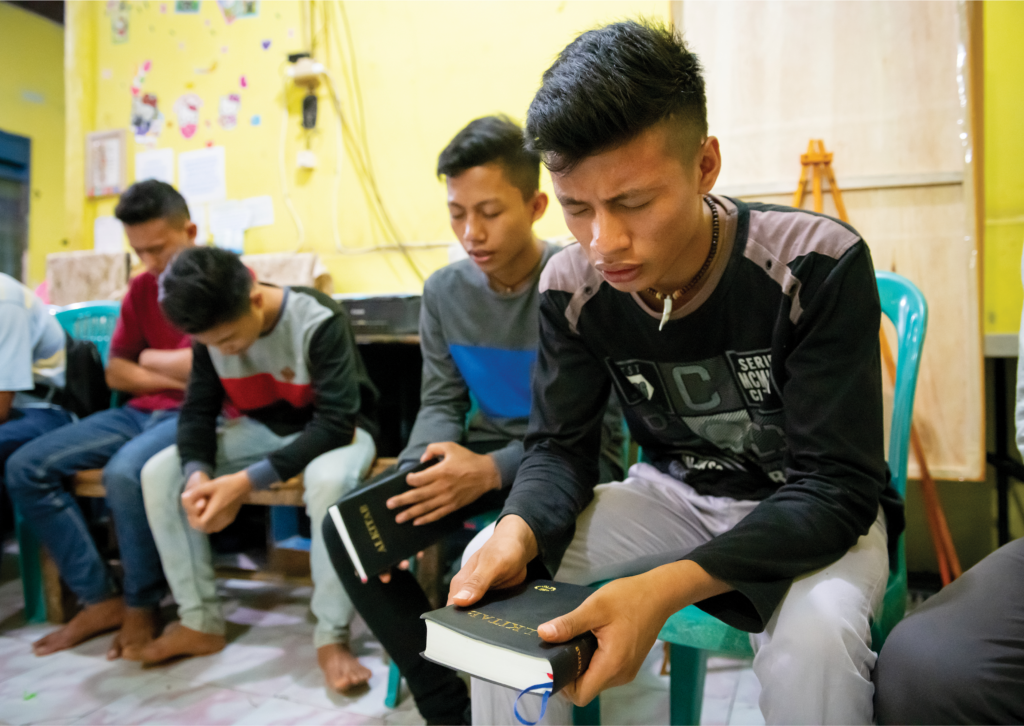At 21, Mehfri enrolled in a Bible school in Indonesia with no intention of studying the Bible. Although he had grown up in a Christian family, he enrolled in the school only to hide from the police, who were after him for selling drugs.
Although he had grown up in a Christian family, he enrolled in the school only to hide from the police, who were after him for selling drugs.
“I was not in the Bible school to get born again,” he said. “When I was in the Bible school, I was thinking how I could sell drugs to the students to get money.”
After a few months at the school, and three years of selling cocaine and Ecstasy, Mehfri was arrested and put in jail. Then, one day, a pastor who visited the jail every Friday gave Mehfri a Bible. As Mehfri began to read the Scriptures, he recalled the few lectures he had paid attention to during his time at the Bible school. The lessons on God’s love spoke to him in his time of need, and his heart was softened toward the Lord.
“I read Romans 10, and at that time I confessed that Jesus is my Lord,” he said. Twenty days later, his father, who had always struggled to make ends meet, came up with the money to pay his bail. Following his release from jail, Mehfri decided to return to the Bible school — this time to study God’s Word.
“I wanted to become someone God sends to share the gospel,” he said. “When I became a student at the Bible school, my heart was not quiet because I wanted many people to know Jesus. There was a fire in my heart to share Jesus with other people.”
After two years in school, Mehfri arranged to begin ministry work on an island in the Philippines, where he served with a house church for two years. He then moved to Mindanao, a region in the southern Philippines known as a radical Muslim stronghold and a difficult place to share the gospel. The government has ceded control to Islamists in some parts of the region, and attacks on Christians are not uncommon. “Not many people want to go there,” Mehfri said, “so this challenged me.”
He quickly joined a house church of three families who cared for and supported one another, working together to share the gospel with their neighbors. “These were not rich people,” Mehfri said. “They were farmers and fishermen. During the two years [I was there], God stayed with me and provided everything. I saw God with me completely.”
After two years with the families in Mindanao, he moved to the Indonesian island of Borneo to study at another Bible school. There, he dug deeper into the Scriptures and focused more specifically on evangelism; he knew he had to know the Bible better in order to share the gospel in Islamic areas.
On Fridays and Saturdays, students from the school shared the gospel with local Muslims. “I shared the gospel with many Muslim people and baptized them,” he said. Remembering how God had turned his criminal life into a witness for the kingdom, Mehfri said he often wept with gratitude when he baptized a new believer. “I was thinking about what had happened in my life,” he said. “Because how beautiful are the feet that bring these things?”
Mehfri formed friendships with students at an Islamic school during his time in western Borneo, even starting an anti-drug group to help them avoid the destructive traps that had once ensnared him. As he shared his anti-drug message with the students, he also gently shared the need for salvation through Christ.

gospel. He later moved to Mindanao, a region in the Philippines, because he knew it
was a difficult place to share the gospel and not many people wanted to go there.
After a few months, a student asked Mehfri for help, saying his friend wanted to learn more about “mercy.” Agreeing to a meeting, Mehfri followed the young man and three of his friends to a cemetery where they were to meet the other friend. But when they arrived, three men were waiting for him. When they started punching him, Mehfri considered fighting back. But he decided that would only hurt his Christian witness, so instead he ran for his life.
Bleeding from the mouth, he took shelter in a nearby church building, where some people helped him recover and escorted him back to the Bible school. He remained at the school as much as possible for the next six months, focusing on completing his studies.
Soon after graduation, Mehfri got a job selling water filters and married a young woman he had met at the school; she gave birth to their first child in 2018. The couple share the gospel together in Muslim villages, where Mehfri reaches out to at least five people a day and often doubles that.
In 2016, Mehfri developed a friendship with a teacher at an elementary school for Muslim children. After meeting with Mehfri two to three times a week for three months to discuss Jesus and the Quran, the man came to faith in Christ. He eagerly taught what he had learned to his school students, until his superiors ordered him to stop. He then focused on studying the Scriptures and leading his family members to Christ.
The next time Mehfri visited the teacher’s home, he was confronted by the man’s son before he could even get off his motorbike. “Are you the one who gave the Bible to my father?” he asked. Mehfri answered in the affirmative and was suddenly attacked from behind by three men with sticks, one blow bruising his right eye. Mehfri quickly fled the scene on his motorbike, speeding toward home.
When Mehfri’s 2-year-old daughter saw him struggling, she encouraged him to stay strong. “You must stay on fire, for me,” she said, pulling his hand. “You must stay on fire.” His daughter was repeating a phrase he had often said to her, which moved Mehfri to smile. His wife, overwhelmed with fear, began to cry. But after Mehfri prayed with her, she then prayed for those who had attacked her husband.
As the threats increased, Mehfri and his family moved to a new city in Indonesia. He has since led 10 people to Christ and baptized six.
Mehfri said he has come to accept persecution as part of his walk with Jesus, who first endured persecution for our sake. “Jesus is the example, the model,” he said. “So we must follow Jesus. We don’t know about the future, but we must face it. We are ready to face more persecution.” — Voice of the Martyrs






